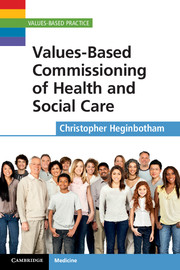Book contents
- Frontmatter
- Contents
- Acknowledgements
- Preface: Values-based Commissioning
- List of Abbreviations
- Chapter 1 Values-based practice in health and social care
- Chapter 2 Policy and practice
- Chapter 3 Health and social care reforms in England
- Chapter 4 Evidence and outcomes: commissioning for value
- Chapter 5 Patient and public involvement
- Chapter 6 The ‘new’ public health
- Chapter 7 Integrative commissioning for health and social care
- Chapter 8 Priority setting and resource allocation: values, ethics, evidence
- Chapter 9 Outcomes-led commissioning
- Chapter 10 Market stimulation and market shaping
- Chapter 11 Values-based leadership
- Endnote
- References
- Index
Chapter 7 - Integrative commissioning for health and social care
Published online by Cambridge University Press: 05 July 2012
- Frontmatter
- Contents
- Acknowledgements
- Preface: Values-based Commissioning
- List of Abbreviations
- Chapter 1 Values-based practice in health and social care
- Chapter 2 Policy and practice
- Chapter 3 Health and social care reforms in England
- Chapter 4 Evidence and outcomes: commissioning for value
- Chapter 5 Patient and public involvement
- Chapter 6 The ‘new’ public health
- Chapter 7 Integrative commissioning for health and social care
- Chapter 8 Priority setting and resource allocation: values, ethics, evidence
- Chapter 9 Outcomes-led commissioning
- Chapter 10 Market stimulation and market shaping
- Chapter 11 Values-based leadership
- Endnote
- References
- Index
Summary
Integrated or joint commissioning
Integrative commissioning is the terminology adopted for commissioning jointly from health and social care agencies and from the third sector as well as from other agencies, such as the Education Department of the local authority or the Police or Probation Service. In this chapter we will consider the way that local authorities, health agencies, the third sector and other agencies can and have worked together to commission a range of services that link together for the purposes of achieving a good mix of services. Whether we have a short-term collage of services or a longer-term integrated provision is less important than the agreement to develop, plan, and commission together.
The chapter considers the way that we obtain information about ‘need’ and how that relates to the ‘values’ of the people whose needs we have ascertained. This will be complemented by discussions about:
needs-based commissioning – of health and social care together with JSNA;
integrated commissioning – the joint and agreed approach that develops from V-BP and E-BM;
health economic and epidemiological models;
culturally relevant assessment and diagnosis – of disease and illness; and
choice and personalisation.
Integrative commissioning builds on JSNA to develop a set of needs and aspirations, strengths and opportunities. The JSNA is a valuable resource, but is also rather overwhelming in its scope. Many local authorities have now finalised their first cut JSNA and they make interesting reading. By and large, the opportunity has been taken to describe the ‘facts’ of needs assessment without the ‘values’ that run alongside. Setting out the needs in this way, especially from a public health perspective, provides a good template for action. The problem then becomes, ‘what action?’ In social services (child and families, and adult) the most significant actions will be those that deal with the reduction in funding and the development of new market ideologies. In Chapter 9 we will see the extent to which the market can address the changes that are needed.
- Type
- Chapter
- Information
- Values-Based Commissioning of Health and Social Care , pp. 69 - 82Publisher: Cambridge University PressPrint publication year: 2012



